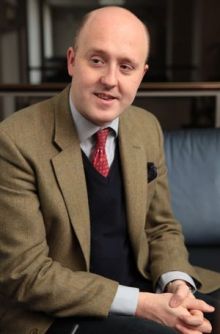Ukrainian audience had an opportunity to hear the program of the famous choir (with a five-century history) – the Music of Advent and Christmas. Its visit to Ukraine was organized by the DF Group of Companies jointly with Dmytro Firtash’s Charity Foundation, and Den/The Day was the information partner of the event. On the eve of the concert The Day interviewed the choir’s director Mark WILLIAMS.
Mr. Williams, how has the choir managed to preserve its unique singing traditions and win even greater recognition?
“The history of the choir singing in Jesus College dates back to 1496 (when this educational establishment was founded). It was then that the chapel where the first students sang for the first time was built. That was how the first ensemble, the Chapel Choir, where only boys and adult men sing, emerged. Later (in 1849) it was reformed. And in 1982, when women were permitted to study in colleges, a new ensemble emerged, the College Choir. Both choirs won excellent repute, and their repertoire is performed during the greatest events in Britain, as well as large-scale international projects. Along with weekly church services the choir members give concerts, record songs, and take part in TV shows and tours abroad. In the past year the College Choir has given concerts in Belgium, Estonia, and the US, and we have scheduled tours to Germany, Africa, India, and back in the US. Currently we’ve come for the first time with a solo program to Ukraine.
“As for preserving traditions, I will tell you the following thing: the College Choir is a part of the culture of the British nation. It has changed together with the society. I can say that its history is a mini-encyclopedia of Great Britain’s development, which illustrates the question of the change in beliefs and relationships within the society.”
How do you select the participants of the choir? What should be the main feature of the future member of the choir?
“The foundations of the choir singing of our ensemble were formed back in the 16th century, and they are based on the Roman-Catholic tradition. At that time a student, subsequently, a member of a choir could be only the person who studied to become a priest. Nowadays the choir may include Cambridge University or Cambridge College students of any specialization, nationality, or religious beliefs. They should pass a selection for this. I can say that the number of aspirants for one of 26 places in the choir is not fewer than of aspirants for one place at the University of Cambridge, which is 10:1. The choir’s current lineup includes even a Sri Lanka student, there is also half-Iranian, several Scots, the rest are English. We have not had any Ukrainians in the choir as yet, but hopefully there will be some. One-third of the choir’s lineup changes annually.
“As for the main demands to the future aspirants, there are quite a few. Of course, you should be a diligent student, you should work on yourself, know several languages, and have a talent for music. But first of all you should sing with your soul: this is the magic sense of music, on which it depends what message people will get from the music.”
You’re a newcomer in Ukraine. Have you ever heard about our state? What are your impressions from what you’ve seen?
“I was told that it is cold here, but when I came I saw that it is warm and foggy like at home, in Britain. (Laughing.) Speaking seriously, of course, I have heard about Ukraine, Europe’s greatest country, before coming here. Besides, many Ukrai-nian students are studying at the University of Cambridge, and there is a special Ukrainian Studies Program, founded by Dmytro Firtash, and its framework includes interesting cultural events, which are connected with Ukrainian folkways and traditions.
“Before Ukraine I have been to many European countries and the US. However, their traditions of choir singing resemble British. But I have heard that they are different in Ukraine. It is very interesting to come to know them. In Ukraine people sing in low and rich voices. I can’t wait till I meet the students of the conservatoire to hear them singing, share my experience with them and pick up some Ukrainian experience. Besides, many singers have lived and created in Ukraine, for example Borys Hmyria.”
What can be practical results of your visit?
“Hopefully, we will manage to establish closer ties between Ukrainian higher educational establishments and the University of Cambridge, which may develop into exchange programs. In my opinion, we should aspire to this, because merging of cultures does not depend on nationality or religious beliefs, and music speeds up the process.”







